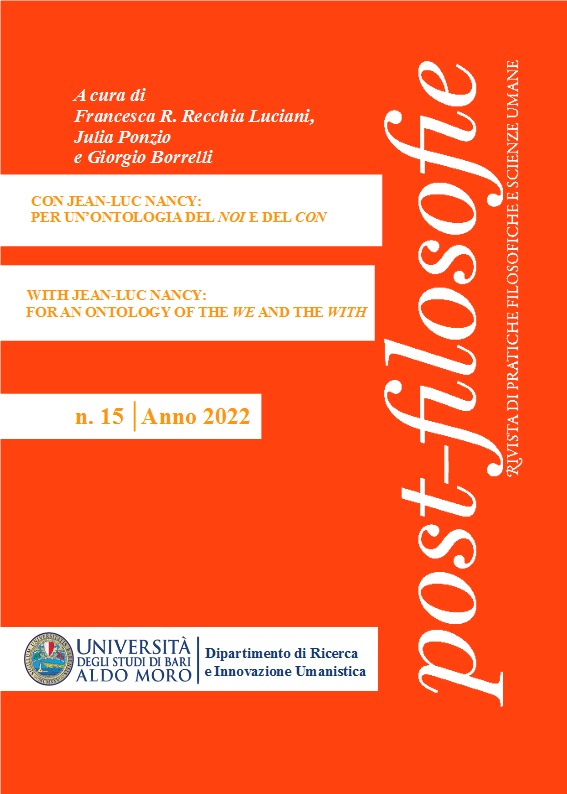Sulla soglia. Jean-Luc Nancy di Francesca Romana Recchia Luciani
DOI:
https://doi.org/10.15162/1827-5133/1838Keywords:
Corpo, Decostruzione, Derrida, Jean-Luc Nancy, Tocco, Body, Deconstruction, Touch, Corps, Déconstruction, ToucheAbstract
Il saggio situa la filosofia di Jean-Luc Nancy tra Hoc est enim corpus meum (Questo è infatti il mio corpo) e Noli me tangere (Non toccarmi). Questi due enunciati – fondatori del pensiero del corpo in Occidente – diventano i fuochi dell’ellissi filosofica, della decostruzione operata da Nancy. Della prima frase resta corpus: elemento residuale, tessera letterale su cui Nancy costruisce Corpus (1992), uno dei suoi libri più importanti. Di Noli me tangere resta in-vece tangere, “toccare”. La sua filosofia del corpo si declina come una filosofia del toccare al punto che Jacques Derrida nomina Nancy il più grande pensatore del toccare di tutti i tempi, dopo Aristotele.
Attorno a questi due fuochi (corpus e tangere) si dispiegano i grandi temi di Nancy: il corpo, l’incontro, il rapporto, la co-relazione, la comunità. E il saggio nasce proprio nell’alveo dell’incontro tra Francesca Romana Recchia Luciani e Jean-Luc Nancy, di cui reca traccia la monografia edita nella collana Eredi di Feltrinelli.
The essay situates Jean-Luc Nancy’s philosophy between Hoc est enim corpus meum (This is indeed my body) and Noli me tangere (Do not touch me). These two utterances – founders of the thought of the body in the West – become the fires of the philosophical ellipsis, of the deconstruction operated by Nancy. Of the first utterance corpus remains residual element, literal tile on which Nancy builds Corpus (1992), one of his most important books. Of Noli me tangere remains instead tangere, “to touch”. Actually, his philosophy of the body is declined as a philosophy of touching. According to Jacques Derrida, Nancy is the greatest thinker of touching of all time, after Aristotle.
Around these two fires (corpus and tangere) Nancy’s great themes unfold: body, encounter, relationship, co-relation, community. And the essay arises precisely in the context of the encounter between Francesca Romana Recchia Luciani and Jean-Luc Nancy, of which the monograph published in Feltrinelli’s Eredi series bears traces.
References
BONNEFOY Y., Nell’insidia della soglia, Einaudi, Torino 1990.
DERRIDA J., Toccare, Jean-Luc Nancy, Marietti, Bologna 2019.
NANCY J.-L., Corpus, Cronopio, Napoli 2020.
―, Del sesso, Cronopio, Napoli 2016.
―, Ego sum, Bompiani, Milano 2008.
―, Il ventriloquo. Sofista e filosofo, Besa, Nardò 2003.
―, Indizi sul corpo, Ananke, Torino 2009.
―, L’esperienza della libertà, Einaudi, Torino 2000.
―, L’intruso, Cronopio, Napoli 2006.
―, Narrazioni del fervore. Il desiderio, il sapere, il fuoco. Moretti &Vitali, Bergamo 2007.
―, Noli me tangere. Saggio sul levarsi del corpo. Bollati Boringhieri, Torino 2005.
RECCHIA LUCIANI F. R., Jean-Luc Nancy, Feltrinelli, Milano 2022.
Downloads
Published
Issue
Section
License
“Post-Filosofie” utilizza Open Journal Systems 2.4.8.5, che è un software open source per la gestione e la pubblicazione di riviste sviluppato, supportato e distribuito gratuitamente dal Public Knowledge Project sotto la GNU General Public License.
Gli autori che pubblicano su questa rivista accettano le seguenti condizioni:
- Gli autori mantengono i diritti sulla loro opera e cedono alla rivista il diritto di prima pubblicazione dell'opera, contemporaneamente licenziata sotto una Licenza Creative Commons - Attribuzione che permette ad altri di condividere l'opera indicando la paternità intellettuale e la prima pubblicazione su questa rivista.
- Gli autori possono aderire ad altri accordi di licenza non esclusiva per la distribuzione della versione dell'opera pubblicata (es. depositarla in un archivio istituzionale o pubblicarla in una monografia), a patto di indicare che la prima pubblicazione è avvenuta su questa rivista.
- Gli autori possono diffondere la loro opera online (es. in repository istituzionali o nel loro sito web) prima e durante il processo di submission, poichè può portare a scambi produttivi e aumentare le citazioni dell'opera pubblicata (Vedi The Effect of Open Access).
"Post-Filosofie" uses Open Journal Systems 2.4.8.5, which is an open source journal management and publication software developed, supported and distributed free of charge by the Public Knowledge Project under the GNU General Public License.
Authors publishing in this journal accept the following conditions:
- Authors retain the rights to their work and assign to the journal the right of first publication of the work, simultaneously licensed under a Creative Commons Licence - Attribution that allows others to share the work indicating intellectual authorship and first publication in this journal.
- Authors may enter into other non-exclusive licensing agreements to distribute the published version of the work (e.g., deposit it in an institutional repository or publish it in a monograph), as long as they indicate that the first publication was in this journal.
- Authors may disseminate their work online (e.g. in institutional repositories or on their website) before and during the submission process, as it may lead to productive exchanges and increase citations of the published work (See The Effect of Open Access).







